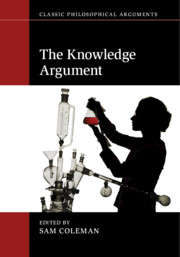Book contents
- The Knowledge Argument
- Classic Philosophical Arguments
- The Knowledge Argument
- Copyright page
- Contents
- Contributors
- Introduction: The Enduring Significance of Jackson’s Knowledge Argument
- 1 The Knowledge Argument Is an Argument about Knowledge
- 2 There’s Nothing about Mary
- 3 Acquaintance, Parsimony, and Epiphenomenalism
- 4 Acquaintance and Phenomenal Concepts
- 5 The Knowledge Argument Meets Representationalism about Colour Experience
- 6 The Mary-Go-Round
- 7 Concept Mastery, Social Externalism, and Mary’s New Knowledge
- 8 Mary’s Powers of Imagination
- 9 The Knowledge Argument Is Either Indefensible or Redundant
- 10 Grounding, Analysis, and Russellian Monism
- 11 Phenomenal Knowledge Why: The Explanatory Knowledge Argument against Physicalism
- 12 The Knowledge Argument and the Self
- 13 What Uninformed Mary Can Teach Us
- Bibliography
- Index
12 - The Knowledge Argument and the Self
Published online by Cambridge University Press: 09 September 2019
- The Knowledge Argument
- Classic Philosophical Arguments
- The Knowledge Argument
- Copyright page
- Contents
- Contributors
- Introduction: The Enduring Significance of Jackson’s Knowledge Argument
- 1 The Knowledge Argument Is an Argument about Knowledge
- 2 There’s Nothing about Mary
- 3 Acquaintance, Parsimony, and Epiphenomenalism
- 4 Acquaintance and Phenomenal Concepts
- 5 The Knowledge Argument Meets Representationalism about Colour Experience
- 6 The Mary-Go-Round
- 7 Concept Mastery, Social Externalism, and Mary’s New Knowledge
- 8 Mary’s Powers of Imagination
- 9 The Knowledge Argument Is Either Indefensible or Redundant
- 10 Grounding, Analysis, and Russellian Monism
- 11 Phenomenal Knowledge Why: The Explanatory Knowledge Argument against Physicalism
- 12 The Knowledge Argument and the Self
- 13 What Uninformed Mary Can Teach Us
- Bibliography
- Index
Summary
Frank Jackson’s knowledge argument is naturally viewed as a more precise version of Thomas Nagel’s argument in “What Is It Like to Be a Bat.” In particular, Jackson directed our attention to the challenge phenomenal knowledge poses for physicalism. Viewed this way, the knowledge argument focuses more on the question of “what it’s like to echolocate” than what it’s like to be a bat. The worry, to put it a more Nagelian way, is that the nature of phenomenal states escapes the objective picture of the world provided by our best sciences. I think there is another strand of Nagel’s argument that often gets ignored and that could be made clearer by a corollary to Jackson’s knowledge argument. This strand sticks a little closer to Nagel’s original question, and directs us to think about what it is like to be, or to have, a self. Just as in Jackson’s original argument, there can be much debate about what the implications of this corollary argument are – whether the implications are metaphysical or not; whether the argument even gets off the ground, etc. But I think the knowledge argument about the self is worth setting forth nonetheless, if only to get a little clearer about something else that might seem to be missing from the objective point of view.
- Type
- Chapter
- Information
- The Knowledge Argument , pp. 254 - 268Publisher: Cambridge University PressPrint publication year: 2019
- 3
- Cited by



